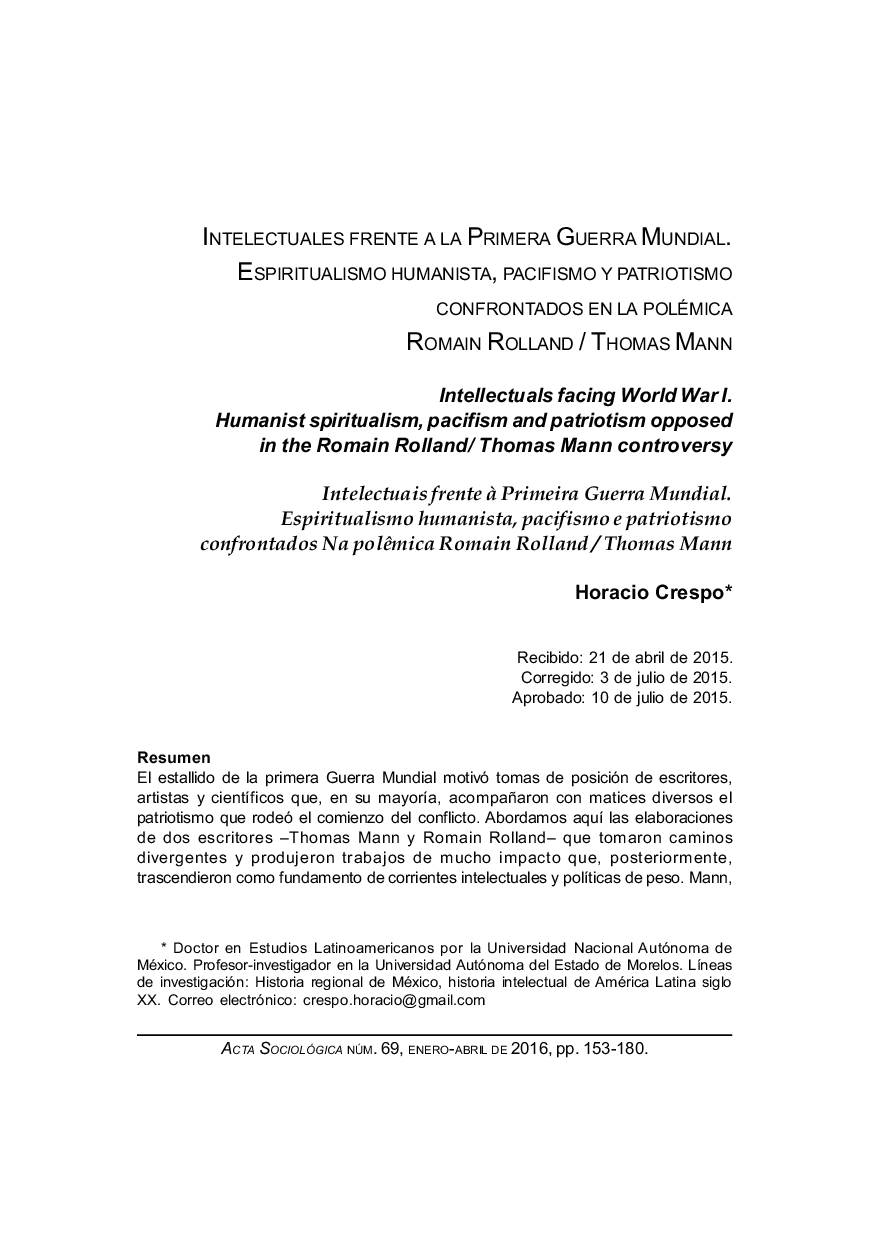| کد مقاله | کد نشریه | سال انتشار | مقاله انگلیسی | نسخه تمام متن |
|---|---|---|---|---|
| 1126402 | 1488583 | 2016 | 28 صفحه PDF | دانلود رایگان |

ResumenEl estallido de la primera Guerra Mundial motivó tomas de posición de escritores, artistas y científicos que, en su mayoría, acompañaron con matices diversos el patriotismo que rodeó el comienzo del conflicto. Abordamos aquí las elaboraciones de dos escritores –Thomas Mann y Romain Rolland– que tomaron caminos divergentes y produjeron trabajos de mucho impacto que, posteriormente, trascendieron como fundamento de corrientes intelectuales y políticas de peso. Mann, germanófilo vehemente en 1914, influyó de manera considerable en la “revolución conservadora” alemana que desembocó en el triunfo del nacional-socialismo, aunque él se haya apartado desde 1922 con su “giro democrático”. Rolland, a su vez, con su rechazo radical de la guerra fue el centro del espiritualismo humanista que luego acompañaría vigorosamente la lucha antifascista. Reseñamos los argumentos que se cruzaron entre ellos, en una polémica que la historia intelectual no ha recuperado todavía, al ser opacada por la confrontación de los dos hermanos Mann en la misma, aunque fue sin duda Rolland el tercero y fundamental en la discordia. Estas participaciones polémicas en la lucha ideológica en torno a la Primera Guerra anticipan la figura del “intelectual comprometido” que tendría prolongada significación, también en América Latina, a partir de la segunda posguerra.
The outbreak of World War I compelled writers, artists and scientists to make a stand. Most of these intellectuals followed, with a plethora of nuances, the patriotism surrounding the beginning of the conflict. This article discusses the work of two writers, Thomas Mann and Romain Rolland. Even though their paths diverged, the work produced by them impacted greatly and transcended as the foundation of significant intellectual and political trends. Mann, a vehement germanophile, in 1914 exerted considerable influence on the German “conservative revolution” that ultimately led to the national-socialism victory, in spite of the distancing that his 1922 “democratic turn” meant. Rolland, in turn, with his utter rejection of war was at the heart of the humanist spirit that afterwards nourished the antifascist struggle. I outline a polemic discussion that has not yet been recovered by intellectual history. The debate has been overshadowed by the dispute between the two Mann brothers but Rolland was the third and crucial party in this feud. Such controversial exchanges in the context of the ideological struggle on World War I anticipates the figure of the “engaged intellectual” that has had a long lasting significance (also in Latin America) since the second postwar period.
ResumoA eclosão da Primeira Guerra Mundial motivou escritores, artistas e cientistas pra tomarem uma posição. A maioria deles acompanharam com diferentes nuances o patriotismo que circulou ao início do conflito. Abordamos aqui o trabalho de dois escritores –Thomas Mann e Romain Rolland– que tomaram caminhos divergentes e produziram trabalhos de muito impacto que posteriormente transcenderam como fundamento de importantes correntes intelectuais e políticas. Mann, germanófilo veemente em 1914, influenciou consideravelmente na “revolução conservadora” alemã que levou ao triunfo do nacional-socialismo, embora ele tenha se distanciado desde 1922 com a sua “virada democrática”. Rolland, por sua vez, com a sua rejeição radical da guerra foi o centro do espiritismo humanista que depois acompanharia vigorosamente a luta antifascista. Revisamos os argumentos que se trocaram entre eles em uma polêmica que a história intelectual ainda não recuperou, sendo ofuscada pelo confronto dos dois irmãos Mann, mas onde Rolland foi certamente a terceira e fundamental pessoa na discórdia. Essas intervenções polêmicas na luta ideológica sobre a Primeira Guerra antecipam a figura do “intelectual comprometido” que teria prolongada significação também naAmérica Latina a partir da SegundaGuerra Mundial.
Journal: Acta Sociológica - Volume 69, January–April 2016, Pages 153–180